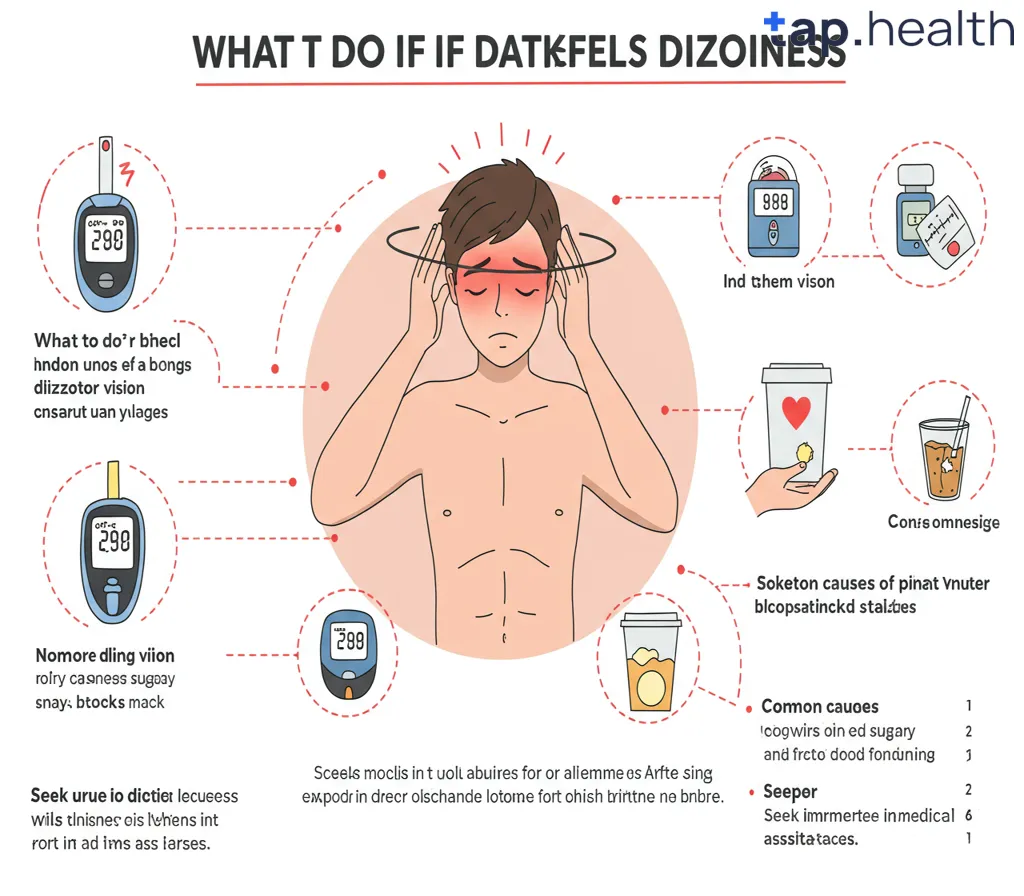Dizziness is a common symptom that people with diabetes may experience, and it can be caused by various factors. It’s important to understand the potential reasons behind dizziness, as it can be linked to blood sugar imbalances, dehydration, or other health issues. If you are a diabetic or taking care of someone with diabetes, it’s crucial to know how to handle dizziness to prevent complications and ensure proper management.
In this article, we’ll explore the possible causes of dizziness in people with diabetes, how to recognize the symptoms, and what actions to take when dizziness occurs.
Common Causes of Dizziness in Diabetics
Dizziness in diabetics can stem from several underlying factors. The most common causes are related to blood sugar levels, but other reasons should also be considered.
1. Hypoglycemia (Low Blood Sugar)
One of the most common reasons for dizziness in diabetics is hypoglycemia, or low blood sugar. When blood glucose levels drop too low (below 70 mg/dL), the body may not have enough energy to function properly, leading to dizziness, sweating, shakiness, and confusion.
Causes of hypoglycemia include:
- Taking too much insulin
- Skipping meals or snacks
- Increased physical activity without adjusting insulin
- Drinking alcohol without eating
2. Hyperglycemia (High Blood Sugar)
Although hyperglycemia (high blood sugar) is less commonly linked to dizziness, it can still cause symptoms like dizziness or lightheadedness, especially if the blood glucose levels are extremely high. When blood sugar levels rise above 180 mg/dL or higher, the body may experience dehydration, fatigue, and dizziness.
Causes of hyperglycemia include:
- Not taking enough insulin
- Overeating or consuming high-carb meals
- Illness or infection
- Stress
3. Dehydration
People with diabetes are at an increased risk of dehydration, especially if blood sugar levels are high. When blood sugar is elevated, the kidneys work harder to remove excess glucose from the blood, leading to increased urination and fluid loss. This fluid loss can cause dehydration, which often leads to dizziness, weakness, and fatigue.
4. Postural Hypotension
Postural hypotension is a condition where blood pressure drops when standing up too quickly. This can be more common in people with diabetes, especially if they are on medications that lower blood pressure. When blood pressure drops too quickly, it can cause dizziness or lightheadedness.
How to Recognize Dizziness in Diabetics
If a diabetic experiences dizziness, it’s essential to pay attention to other accompanying symptoms to determine the cause:
Symptoms of Low Blood Sugar (Hypoglycemia):
- Dizziness or lightheadedness
- Shakiness or trembling
- Sweating excessively
- Irritability or confusion
- Hunger or nausea
- Rapid heartbeat
Symptoms of High Blood Sugar (Hyperglycemia):
- Dizziness or feeling faint
- Fatigue or weakness
- Excessive thirst
- Frequent urination
- Blurred vision
- Nausea or vomiting
Symptoms of Dehydration:
- Dizziness or lightheadedness
- Dry mouth and skin
- Fatigue or weakness
- Dark-colored urine
- Headache
What to Do If a Diabetic Feels Dizzy
When a diabetic feels dizzy, the first step is to determine whether the dizziness is due to low blood sugar (hypoglycemia) or high blood sugar (hyperglycemia), as the treatment for each is different. Below are steps you can take based on the possible causes:
1. If the Dizziness is Due to Low Blood Sugar (Hypoglycemia)
If you suspect that low blood sugar is the cause of dizziness, it’s essential to raise the blood sugar quickly. Here’s what to do:
- Check Blood Sugar: If possible, use a blood glucose meter to check the blood sugar level. If it’s below 70 mg/dL, immediate action is needed.
- Consume Fast-Acting Carbs: If blood sugar is low, consume 15 grams of fast-acting carbohydrates to raise your glucose levels. Examples include:
- 1/2 cup (4 oz) of fruit juice (orange juice or apple juice)
- 1 tablespoon of sugar or honey
- 3-4 glucose tablets
- 1/2 can of regular soda (not diet)
- Wait and Recheck: Wait about 15 minutes and recheck blood sugar levels. If it’s still below 70 mg/dL, consume another 15 grams of carbs and recheck in 15 minutes.
Once blood sugar stabilizes, it’s essential to eat a balanced snack (such as nuts, cheese, or a whole grain cracker) to prevent the blood sugar from dropping again.
2. If the Dizziness is Due to High Blood Sugar (Hyperglycemia)
If you believe the dizziness is caused by high blood sugar, it’s important to take steps to bring the blood sugar level down gradually:
- Check Blood Sugar: Check the blood glucose level using a blood glucose meter. If blood sugar is above 180 mg/dL, it may indicate hyperglycemia.
- Administer Insulin: If prescribed, administer insulin to lower the blood sugar level. It’s crucial to follow your doctor’s instructions regarding insulin doses.
- Hydrate: Drink plenty of water to help flush out excess glucose through urine and rehydrate the body. Dehydration can worsen dizziness.
- Rest: Rest and avoid physical activity until blood sugar stabilizes, as exercise can further raise blood sugar in some cases.
If blood sugar remains high and symptoms persist, contact your healthcare provider for further advice.
3. If the Dizziness is Due to Dehydration
If dehydration is the cause of dizziness, the following steps can help restore hydration and relieve dizziness:
- Drink Fluids: Drink water or electrolyte drinks that don’t contain too much sugar. Drink slowly and continuously throughout the day.
- Monitor Urine Output: Watch for signs that the body is properly hydrated, such as frequent and clear urination.
- Avoid Caffeine and Alcohol: Both of these can contribute to dehydration and worsen dizziness.
When to Seek Medical Help
While dizziness is often manageable, it’s important to seek medical attention in the following situations:
- If dizziness is severe and does not improve after following the steps for managing low or high blood sugar.
- If the dizziness is accompanied by confusion, difficulty speaking, or blurry vision, which may indicate more severe complications like a diabetic emergency.
- If you experience frequent dizziness: Frequent episodes of dizziness could indicate poorly managed blood sugar levels or an underlying health issue that needs medical attention.
- If dizziness is unexplained: Sometimes, dizziness can be related to other conditions such as infections, heart problems, or medication side effects. If the cause is unclear, a healthcare professional should be consulted.
Conclusion
Dizziness can be a concerning symptom for people with diabetes, but understanding the potential causes and knowing how to react can help prevent more serious complications. Whether it’s due to low blood sugar (hypoglycemia), high blood sugar (hyperglycemia), or dehydration, quick and effective action is key to managing the situation. By checking blood sugar levels and following the appropriate treatment steps, individuals with diabetes can avoid serious health risks associated with dizziness.



